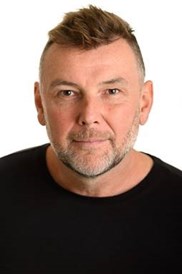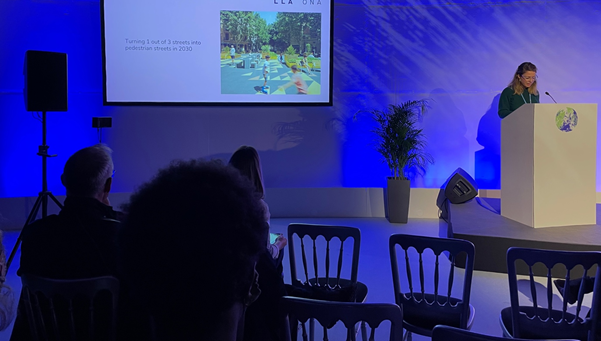Timothy Crawshaw MRTPI is an International Planning and Development Consultant. He is currently the RTPI’s Vice-President and will become President in 2022. In the third of this three part blog series Timothy reflects on COP26 and its impact on inequality.
The Need for Systems Change
 A short train ride from COP 26 in Glasgow to the V&A at Dundee was an opportunity to attend the Design Council - Design for Planet Festival attended by an invited group of designers and thought leaders. An important theme that emerged from an early session on the second day was the need for systems change in terms of how products, projects and services are designed. The role of the designer as a change agent was celebrated and the need to change approaches to materials and resources highlighted. The importance of responsible commissioning was a key takeaway and the role of design as a force for good was a positive and energising message.
A short train ride from COP 26 in Glasgow to the V&A at Dundee was an opportunity to attend the Design Council - Design for Planet Festival attended by an invited group of designers and thought leaders. An important theme that emerged from an early session on the second day was the need for systems change in terms of how products, projects and services are designed. The role of the designer as a change agent was celebrated and the need to change approaches to materials and resources highlighted. The importance of responsible commissioning was a key takeaway and the role of design as a force for good was a positive and energising message.
This need for systems change was a strong theme for the week, and the need for a different approach to design and planning is going to be required for the coming challenging years. Systems thinking and an understanding of natural processes and functions engendering an efficient and circular economy and patterns of consumption where we learn from nature and work in harmony is beginning to take route in the mainstream, which is encouraging. This however highlights the stark contrast between business as usual whereby substitutes and offsetting could become the default choice as opposed to a more questioning and transformative approach. Less may be more.
For Planners and urban designers this raises questions of how we can influence outcomes upstream and set the scene is smart ways the make sustainability and net zero the obvious choice.
Living well within planetary boundaries
Many of the threats to life on earth are a product of the Anthropocene and large amounts of ingenuity has, often as a consequence of growth and a form of progress, led to the exceeding of four of the nine planetary boundaries as described in simple and animated terms by Kate Raworth at the Design for Planet Festival and the basis of ‘Doughnut Economics’. A key challenge lies in how the benefits of prosperity and growth be distributed equally ensuring the maximum number of people benefit from the creation of wealth. Of the mechanisms proposed to ensure that economies become distributive, Planning is at the centre and in particular the distribution and benefits from land and resources and the reclamation of the Commons will be the work of the future. Allied to this the role of open data is also going to be an important component of the future and the potential for planning to be part of a regenerative system that senses, learns and self-repairs are exciting potentialities.
The very ingenuity that has led to the current crisis is how we can solve these urgent problems and propose a new paradigm, Planners should be at the centre of this work, and underrepresented groups need to be involved.
Women Leaders and Participatory Planning Leading the Way
There were many talks in the Green Zone that highlighted the power of participatory planning and the need to hand over the pen to underrepresented groups and those not engaged in the planning process. This is an important mechanism to ensure that good practice is localised, relevant and adopted delivering long term sustainable places that support human and non-human life. I was deeply impressed by the showcase of “Women leaders transforming street design” hosted by Living Streets in the Green Zone. With inspiring talks from around the world the concept of ‘Universal Design Principles’ as described by Janet Sanz, Deputy Mayor, Barcelona demonstrates the power of designing cities through the eyes of women, children and older people in creating walkable compact neighbourhoods. The Superilla Programme demonstrates the principles delivered on the ground retrofitting existing streets to create healthier and green places for people.

A reminder of our interconnected relationships
A reminder of our relationship with all beings on this planet came in the form of a performance of “Being Salmon, Being Human” in the Green Zone on the same day as the Cities, Regions And Built Environment Day. This deeply moving performance at once tells a story of exploitation and factory farming and at the same time reminds us of the complex ecosystems on which we rely, and which for millennia was symbiotic and balanced. Combining performance, poetry, music and dance the dominant subject – object relationship between human and non-human life and the wider environment is challenged.
“Being storytelling animals, we humans act within the world according to the way we perceive it. If we experience the oceans and those who dwell therein to be alive, to be a great interiority, we will encounter this vast sphere of otherness with mutuality and respect. If, on the other hand, we perceive the oceans and their inhabitants as a mere ‘environment’ which is ‘out there’, as ‘raw material’, or ‘resource’, or ‘warehouse’ there for us to be exploited, we will treat them accordingly.”
Dr. Martin Lee Mueller
The performance received a standing ovation and, in many ways, reached people in a way that a purely technical discourse would struggle to go.
As we understand more about the natural world and our interconnectedness emerging research into the symbiosis between trees and fungi through unseen systems it is a timely reminder that our planet is a complex and entangled system. A more inclusive approach to planning is the means to fostering a deeper understanding of our relationship to each other and the planet, we are only as successful as those left behind.
Reflections on COP26
If you're interested in COP26 outcomes why not join this special RTPI webinar on 13 December 2021 looking at reflections on the summit and the Ambitions for the North.


